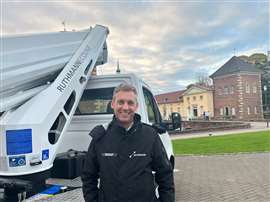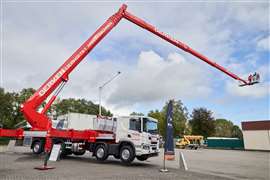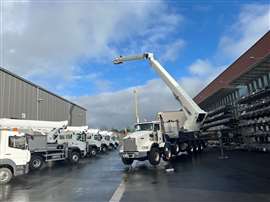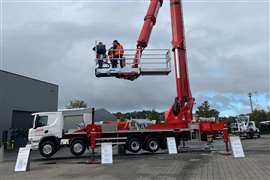Intervew: Ruthmann and the world’s largest truck mounts
18 November 2024
In a bid to leave behind the production supply chain and bottleneck issues of recent times, Ruthmann has reorganized production and is expanding facilities in key growth markets like the US. That’s in addition to the company’s recent launch of a 100m working height truck mount incorporating cutting edge design.
 Uwe Strotmann 2: Uwe Strotmann, Managing Director, Ruthmann.
Uwe Strotmann 2: Uwe Strotmann, Managing Director, Ruthmann.
Heading up the company is Uwe Strotmann, who has been with Ruthmann for 30 years and took over as Managing Director two years ago from longstanding MD Rolf Kulawik, who went into retirement.
While Strotmann’s position in the company’s upper management team for the last 14 years means there will be no sudden shifts in direction under his leadership, “the situation has changed,” he says, in two specific ways.
Firstly, Ruthmann is now part of the US-based Time Manufacturing Company, having been acquired in February 2021, and secondly the influence of Covid-19 and the ensuing supply chain crises has had a fundamental affect on the company.
“When I started [as MD] two years ago [shortly after the pandemic] the company really was in a situation where we working in the short term,” says Strotmann.
|
The future for ReachMaster As Ruthmann’s expansion continues in the US, the company has refocused its US-based Ruthmann/ReachMaster division. Ruthmann acquired its North American distributor ReachMaster in 2020, which also represented a range of other European OEM products in the US. In the third quarter of this year it was announced that ReachMaster would stop representing third party brands that were not within its parent company Time Manufacturing, including Italian bi-levelling crawler specialist AlmaCralwer. The move resulted in some personnel leaving the company says Strotmann, however Ruthmann Reachmaster remains in place and will see its facilities expanded to take advantage of the growing truck mount market in the country, with a new location six miles away from the current base in Houston, Texas. Ruthmann’s other product line Bluelift spider lifts will also be represented there, as will the Ecoline of truck mounts. Strotmann explains, “Being part of the Ruthmann group of companies, we decided ReachMaster will represent Time products only. It is a strategic move in that we concentrate on our products and step away from selling third party products as a distributor. “We will role out this strategy with the tall Steiger machines, medium machines and the Ecoline, but also add other truck mounts from Europe on a lighter chassis like the VTX240 from Versalift in Denmark – we see a market for this in North America on a Ford Transit.” On the subject of those companies that are no longer being represented by Ruthmann/ReachMaster, Strotmann says the company will look after them. “We are in talks with them. We will support them in service for a transition period and not let our customers down, and we will help them establish a new distributor in the US. “Our service people there are trained in these products, so will ensure the customers are taken care of.” |
“People were sent home because we didn’t have the parts and we didn’t have the trucks. So it was possibly not the easiest of starting points for me. However, if you start at a very low level it is easier to go up again.”
As 2022 went on the situation improved, and in 2023 “we really had a good year,” says Strotmann, “and developed the turnover and overall results into a good direction, based on a stable order backlog.” This positive trend is set to continue through 2024 and 2025.
The only bottleneck that remains is in the logistics division, which is set to double in size thanks to a new centre which will be built in the same location on the backlot of Ruthmann’s headquarters in Gescher-Hochmoor, Germany.
There has also been a change to the current production system. Rather than units being moved from place to place in the factory as they are built, the equipment stays in one spot, with the materials and expertise brought to the machine. This approach provides a greater ability to react to market demands.
“We need to have flexibility in production, and it helps if you have this type of box production, where you have enough space to build whatever is ordered at the time.”
Larger lifts
One of the demands in the truck mount market is for big truck lifts of 50m and above.
“Over the last 10 years that has become a worldwide market,” observes Strotmann, “With peaks in north America and upcoming markets in Australia and stability in Europe. And countries like Turkey, and the Middle East are picking up too.”
In response Ruthmann has just launched its latest innovation – a ‘compact’ 100m working height truck mount that is setting the scene for the company’s global growth plans. (See all the details of the new Steiger T1000 HF here).
Expanding on the growing market for larger truck mounts, Strotmann says the company’s 51m units have now become a commodity product. “Many rental companies have them now, even the smaller ones because its compact and short, plus it has the outreach and flexibility, and the applications and the utilization are there.
“Once you go higher to 60m, 70m, 80m, and 90m the number of units is of course lower but overall the number of units are rising year by year and that is thanks to much demand in the existing markets we had before, i.e. in Europe and new markets, with one of the outstanding ones being the US.”
National requirements
 The 100m Ruthmann Steiger T1000 HF.
The 100m Ruthmann Steiger T1000 HF.
Even in Europe, countries vary greatly in their needs, including Spain, which is seeing one of the largest growth curves on the continent. “Customers in Spain use equipment that would be considered unusual in Germany, for example maintenance of big ships in harbors, where two or three 75m machines are working simultaneously. In the past they may have used self propelled lifts but they now need the outreach that self propelled machines do not offer. Everything is getting bigger – if it’s up over and back, then you need a truck mount.”
Then there are the other new and emerging markets like Mexico, Chile and Latin America more widely.
A major new application for big trucks mounts everywhere is power transmission lines, both for maintaining and updating those built in the 1960s and 1970s, alongside a whole network of new ones to service wind farms that are being built across the globe.
“That is a new market that starts with 50m machines and goes up to 90m – we have customers in Australia, the US and Europe,” explains Strotmann.
Core products
While the big units are seeing an increase in demand, a core area of the market remains the 3.5 tonne GVW machines in Europe, which remains a thriving area of activity and sales. “Everyone says it must come to an end sooner or later but at the moment we don’t see that. There is real stability there.”
However, the real potential for growth still remaons with the 50m units and upwards, on 18 tonne trucks and above.
“That’s the real potential for growth, and growth particularly outside of Europe. You can’t bring a 3.5 tonne into countries where you don’t have a 3.5 tonne permission and of course there are many manufacturers in this class, therefore it makes sense to concentrate where you can differentiate yourself from others and for us that is for sure machines that are in the 50m and upwards space.”
 Ruthmann’s headquarters currently mounts lifts for the US market onto Kenworth trucks and ships them back to Ruthmann/ReachMaster.
Ruthmann’s headquarters currently mounts lifts for the US market onto Kenworth trucks and ships them back to Ruthmann/ReachMaster.
North America represents one of those markets. The tradition in the US of using truck mounted platforms soley for utility-related work and hot wire power line applications is starting to give way to the day-to-day applications found in Europe.
“I first visited the US 20 years ago, and I thought then that there are all kinds of applications suitable for truck mounts but they are all done with self propelled access equipment - I wondered, ‘why don’t they use truck mounts?’“
“And I thought, someone needs to start a truck mount rental business in the US.”
Strotmann adds, “We are now at a point where these truck mounted platforms have proven their place in the market starting from the windmills and then going over to other applications.”
Having said that the general use market for truck mounts still has some way to go before it becomes a go to product. “It’s not yet like Europe where a 75m is rented out for a day to inspect a church for example, but we are somewhere between that, and the market is very interesting, and our idea is to accompany our customers on the way to these solutions.”
Strotmann believes the company now has around 50 tall machines in the US, mainly in 75 and 90m working height arena.
However, it’s not all about the big lifts in the US, Ruthmann is also selling its lower rated Ecoline in the country – “We send those kits to the US and Ruthmann ReachMaster puts them on a Ford Transit”, which is a 4,300kg rated truck, rather than the 3.6 tonne GVW in Europe.
Again, they are being used for a host of wider applications, such as sign repair and advertising, similar to Europe, rather than the utility-based work traditionally carried out by units of that size in the US.
On that note, Ruthmann ReachMaster, the company’s subsidiary in the US is also seeing considerable investment to cater for potential growth. (See the the Ruthmann/ReachMater box in this feature).
Electric issues
Looking at product development, Electric equipment is “the big elephant in the room over the last three years,” says Strotmann.
 Ruthmann’s Ecoline 270.
Ruthmann’s Ecoline 270.
Ruthmann has an established offering of electric and hybrid truck mounts and is in an ideal position to comment on the market. “You see a full electric driven truck and then you find out how many are being sold - that’s the issue across the market, and it’s the same with us.”
Strotmann adds, “The market is not there and our customers with full electric machines don’t get any more money for them, but they pay more.
“We are in a kind of trap. How can politicians expect people to invest in these machines when they don’t have return on investment? We are in a waiting position to see how this develops.”
Strotmann continues, “As a company, we are prepared and ready to go in when the door is open, but I believe the real success will come when there are political decisions to prioritize the full electric truck.”
Currently, hybrid is the realistic answer. “Our 3.5 tonne hybrid was rolled out years ago and the 7.5 tonne at last Bauma, and they are successful.” Mostly the customers are found in official and government municipalities, as well as utility related companies.
“We’re now rolling it out to taller machines where we see demand, which is mainly for silent working and zero emissions in city centers and offering a bridge between combustion power and full electric.”
STAY CONNECTED



Receive the information you need when you need it through our world-leading magazines, newsletters and daily briefings.
CONNECT WITH THE TEAM







